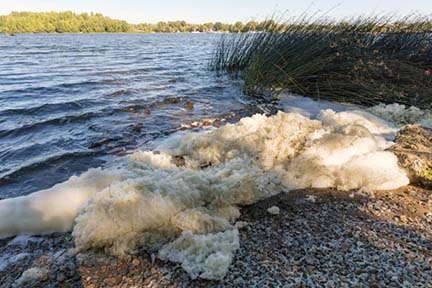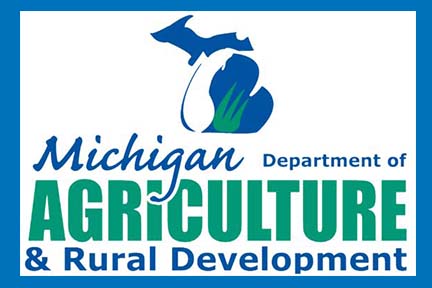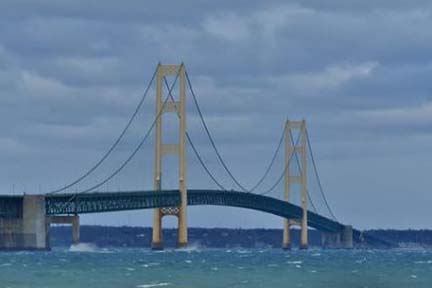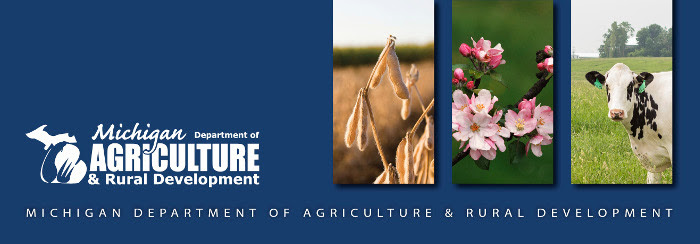
by orionontv | May 16, 2025 | Environmental
|
Press Release
FOR IMMEDIATE RELEASE: May 16, 2025
CONTACT: Laina Stebbins, 517-241-2112, [email protected]
MDHHS recommends Michigan residents
and visitors avoid foam on surface water
LANSING, Mich. – With summer approaching, the Michigan Department of Health and Human Services recommends Michigan residents and visitors avoid foam on Michigan lakes, rivers, streams and other surface waters.
Foam can form on any body of water. It can be white, off-white or brown; have an earthy or fishy scent; and pile up in bays, eddies, dams or other river barriers.
Sometimes foam can contain harmful chemicals or bacteria. This can include high levels of per- and polyfluoroalkyl substances (PFAS). Some studies have found that high exposure to some PFAS is linked to high cholesterol and liver damage, among other health effects.
If you touch any foam, rinse off or bathe as soon as possible. This is especially true if the water is suspected to be contaminated with PFAS. Touching foam without rinsing off or bathing can lead to accidentally swallowing foam and its contents.
“The risk of PFAS exposure through your skin is low. However, you can accidentally swallow PFAS, as well as bacteria, algae, viruses and other chemicals, if you do not rinse off or bathe after touching foam,” said Dr. Natasha Bagdasarian, chief medical executive. “Rinsing off or bathing after water activities will help protect you, your family and your pets from harmful substances that may be in foam or water.”
The Michigan Department of Agriculture and Rural Development also recommends people keep their animals from touching or swallowing foam on bodies of water. Animals can swallow foam that has built up in their fur when grooming themselves. If animals touch foam, they should be rinsed off and bathed with fresh water. Pet owners with questions related to animals and foam should contact their veterinarian.
For more information about PFAS concentrations and bacteria that can be found in foam in Michigan, see the 2021 Surface Water Foam Study.
Anyone with questions about exposure to PFAS or foam can call the MDHHS Environmental Health Hotline at 800-648-6942.
More information about PFAS on surface water is available at FAQ: PFAS foam on lakes and streams. |

by orionontv | May 16, 2025 | Regional News
FOR IMMEDIATE RELEASE
May 15, 2025
Contact: Ron Leix, Treasury, 517-335-2167
Returns for some retirees up by average of $600, for working families up $900, total of more than $2.98 billion in refunds delivered to Michiganders
LANSING, Mich. – State individual income tax refunds increased for Michiganders during the 2025 tax filing season, according to the Michigan Department of Treasury (Treasury).
Nearly a month since the April 15 “Tax Day” deadline, more than 3.5 million refunds were issued at an average of $843 per return, up 50% since 2022. To date, Michigan has issued more than $2.98 billion in refunds.
“Working families are getting the tax relief they deserve,” Gov. Gretchen Whitmer said. “Our work to roll back the retirement tax and quintuple the Working Families Tax Credit has already saved hundreds of thousands of Michiganders on their taxes and put more money back in their pockets. Our average refund for individual filers is up to $843, which is up 50% in three years, meaning more families can pay the bills, put food on the table, or save for a rainy day.”
This filing season, 207,000 retiree tax returns saw increased refunds because of the retirement tax changes. Refunds for these retirees jumped nearly $600 on average, distributing roughly $120 million. In addition, the Homestead Property Tax Credit increased about $70 million, providing additional refund relief to taxpayers due to increasing housing costs.
The quintupling of the Michigan Earned Income Tax Credit for Working Families has also meant an average refund of $900 for working families.
“The Michigan Department of Treasury is committed to issuing refunds as soon as practical,” State Treasurer Rachael Eubanks said. “My team has worked hard to ensure taxpayers receive their refunds in a timely manner. Putting more money in the pockets of Michiganders helps as we navigate federal policy uncertainty.”
In 2023, Governor Whitmer signed legislation to quintuple the Michigan Earned Income Tax Credit for Working Families and roll back the retirement tax.
To learn more about Michigan’s income tax, go to www.michigan.gov/incometax.
State Individual Income Tax Filing Season Statistics (2022-2025) *
|
|
2022
|
2023
|
2024
|
2025
|
|
Total Returns Processed
|
4,373,726
|
4,389,377
|
4,385,046
|
4,419,226
|
|
Refunds Processed
|
3,064,523
|
3,203,498
|
3,623,806
|
3,536,700
|
|
Total Refund Amount (in Millions)
|
$1.72 billion
|
$1.96 billion
|
$2.64 billion
|
$2.98 billion
|
|
Average Refund
|
$560
|
$614
|
$728
|
$843
|
*As of mid-May in each year.

by orionontv | May 16, 2025 | Agriculture
| For immediate release: May 15, 2025
Media contact: Lynsey Mukomel, 517-290-1734
MDARD Advises Consumers and Michigan Food Industry of Potentially Harmful, Unapproved Ingredients in Some Food Products
LANSING, Mich. – The Michigan Department of Agriculture and Rural Development (MDARD) reminds consumers to check product labels for unapproved ingredients amid a rise in the availability of foods and dietary supplements containing potentially harmful psychotropic or psychoactive substances.
“Psychoactive or psychotropic substances, when added to foods or dietary supplements and consumed, can affect mental processes like perception, consciousness, cognition or mood and emotions and are not legal to use as food ingredients,” said Tim Slawinski, MDARD Bureau of Food Safety and Animal Health director. “Many food products claiming to contain these and similar ingredients may be inaccurately labeled and could produce unexpected or potentially harmful side effects.”
Unapproved ingredients include psychotropic and/or psychoactive mushrooms like psylocibin and A. muscaria, cannabis-based ingredients, non-noble forms of kava, kratom and other potentially harmful ingredients. Potential side effects of consuming these types of unapproved ingredients could include liver toxicity, seizures, elevated blood pressure and heart rates, reduction in motor skills and hallucinations. Foods containing these ingredients are considered adulterated according to the Michigan Food Law and the federal Food, Drug and Cosmetic Act (Sec 402(f)(1)(B)). Dietary supplements are defined as food under the Michigan Food Law.
Many consumable products containing these unapproved ingredients have entered the market in recent years. However, these products are unlawful and cannot be legally sold or produced in Michigan or cross state lines. These ingredients have not satisfied the criteria necessary for being listed on the generally recognized as safety (GRAS) list for use. Consumable products containing any form of these unapproved ingredients are suspected of adulteration and therefore are not allowed in the manufacturing, holding, distribution or sale of food in Michigan.
Outside of the marijuana regulations, any substance that will be added to food, drink or animal feed (including dietary supplements) must first be approved by the U.S. Food and Drug Administration (FDA) for that intended use. There is no legal path for manufacturing, selling or holding food products containing other psychoactive or psychotropic food additives in Michigan.
If you have questions, please contact the MDARD Human Food Division at [email protected]. |

by orionontv | May 16, 2025 | Regional News

Gov. Whitmer Makes Appointments to the Bench
LANSING, Mich. —Today, Governor Gretchen Whitmer announced the appointments of Judge Aliyah Sabree and Nicole Castka to the Third Circuit Court in Wayne County.
“Today, I am proud to appoint Judge Sabree and Nicole to the bench,” said Governor Whitmer. “Both of these skilled legal professionals bring years of experience to their new roles, where I am confident they will serve the people admirably and uphold the rule of law.”
Third Circuit Court– Wayne County
Honorable Aliyah Sabree currently serves as chief judge pro tem at the 36th District Court in Detroit, where she has served since her appointment to the bench in 2017. Prior to serving on the bench, Judge Sabree worked as an associate general counsel at the Detroit Water and Sewage Department, as a liaison to the City Council at the Detroit Mayor’s Office, and as an Assistant Wayne County Prosecutor.
Hon. Aliyah Sabree earned her Juris Doctor from Michigan State University College of Law and holds a Bachelor of Science in biology from Youngstown State University.
“It is with extreme gratitude that I accept Governor Whitmer’s appointment to the Third Circuit Court bench,” said Judge Sabree. “I look forward to serving the Wayne County community with dedication and integrity.”
This appointment was made to fill a partial term following Judge Charles Hegarty’s decision to vacate this seat. Judge Sabree’s term will commence on June 9, 2025, and expire at twelve o’clock noon on January 1, 2027.
3rd Circuit Court – Wayne County
Nicole Castka is a sole practitioner focused on criminal defense at the Law Office of Nicole L. Castka, PLLC., in Detroit, which she founded in 2003. Castka is a member of the National Association of Criminal Defense Lawyers, the Wayne County Criminal Defense Bar Association, the Michigan Association of Justice, Women Lawyers Association, and the Detroit Bar Association. She is also an alumnus of the National Criminal Defense College.
Nicole Castka earned her Juris Doctor from the University of Detroit-Mercy School of Law and holds a Bachelor of Arts in political science and history from Otterbein College.
“I am so deeply honored and grateful for the trust put forth by Governor Whitmer and her office to give me the opportunity to serve the citizens of Wayne County in a much deeper capacity than I have been able to in my private practice,” said Castka. “I will ensure that all parties appearing before the bench will be treated with dignity and respect and that justice will be upheld.”
This appointment was made to fill a partial term following the resignation of Judge Mariam Bazzi. Castka’s term will commence on June 30, 2025, and expire at twelve o’clock noon on January 1, 2027.

by orionontv | May 15, 2025 | Transportation

FOR IMMEDIATE RELEASE
May 15, 2025
|
|
MEDIA CONTACT
James Lake
906-250-0993
[email protected] |
Weather delays Mackinac Bridge joint replacement completion
ST. IGNACE, Mich. – Cold, rainy weather early in the season has delayed completion of this year’s work to repave portions of the Mackinac Bridge and replace a modular joint, which will result in extended lane closures.
While contractors have completed replacement of half of the modular joint over Pier 34 on the bridge at the start of the north viaduct span, as well as repair and repaving the southbound lanes of the north viaduct, work continues on replacing the other half of the modular joint on the northbound lanes of the bridge. That work is currently anticipated to be completed by May 29, about a week later than expected.
“We worked with the contractor to ensure that the planned work could be completed prior to the Memorial Day weekend, but poor weather conditions delayed this year’s start of work and the modular joint installation took longer than expected,” said Bridge Director Kim Nowack. “Unfortunately, this means that there will be lane closures in place for the holiday weekend, but crews are working diligently to wrap the project up and get those lanes reopened.”
Weekend traffic peaks between 10 a.m. and 4 p.m. often result in traffic backups, even with all toll lanes open. Drivers should consider crossing at off-peak times or prepare for delays.
“While Memorial Day weekend typically marks the seasonal increase in traffic volumes on the bridge, we fortunately did not see backups during last year’s work, and traffic flowed smoothly,” Nowack said. “We hope that will be the case this holiday weekend.”
To ensure the work is completed prior to the seasonal rise in traffic volumes on the bridge, the scope of work for this season was reduced with the goal of reopening all lanes of the bridge before Memorial Day weekend.
Deck repairs and repaving of the remaining sections of the southbound side of the bridge will be scheduled at a later date as a separate project.
Last year, the northbound side of the bridge was repaired and repaved. While scheduled for completion prior to Memorial Day 2024, work and lane closures extended into mid-June.












